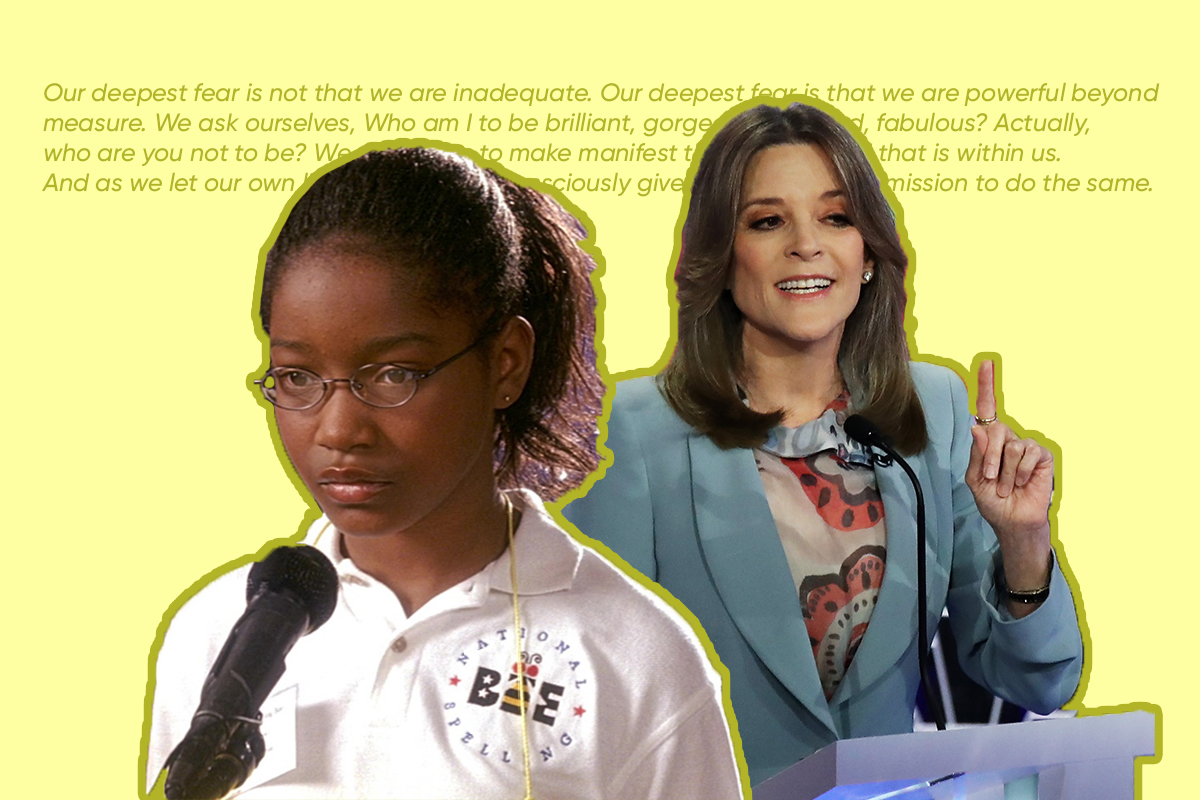If you were alive and watching movies around 2006, you probably remember the inspiring drama Akeelah and the Bee. This award winning film, starring Keke Palmer (where she got her start!), tells the story of Akeelah Anderson, an 11-year-old girl living in South Los Angeles whose talent for spelling leads her to compete in the National Spelling Bee.
As a black preteen from a low-income community, she often feels that she does not belong in the competitive world of spelling bees. In Akeelah and the Bee, it’s (mostly) privileged kids who compete, coming from wealthy backgrounds that allow for private tutoring. Akeelah’s relationship with her coach, Dr. Larabee (played by Lawrence Fishburn), becomes a centerpoint of the film. In one iconic scene, Dr. Larabee inspires a doubtful Akeelah to take pride in her intelligence, asking her to read aloud a beautiful quote. The following is a transcript of that scene (via IMDB):
Akeelah: Our deepest fear is not that we are inadequate. Our deepest fear is that we are powerful beyond measure. We ask ourselves, Who am I to be brilliant, gorgeous, talented, fabulous? Actually, who are you not to be? We were born to make manifest the glory of God that is within us. And as we let our own light shine, we unconsciously give other people permission to do the same.
Dr. Larabee: Does that mean anything to you?
Akeelah: I don’t know.
Dr. Larabee: It’s written in plain English. What does it mean?
Akeelah: That I’m not supposed to be afraid?
Dr. Larabee: Afraid of what?
Akeelah: Afraid of… me?
Watching for the first time as an 8-year-old with a love for spelling and books, seeing Akeelah affirm herself in this scene inspired me to take pride in my own love for the written word. To not be ashamed when I excelled, and to remind myself that I was worthy.
Anyway. Flash forward to last week, when I looked up quotes from Marianne Williamson, hoping to become more familiar with the Jewish presidential candidate and the reason for all the Twitter hubbub surrounding her. To my surprise, the first quote I found was from Marianne’s book, which was none other than THE QUOTE FROM THAT SCENE IN AKEELAH AND THE BEE!!
The quote comes from Williamson’s book A Return to Love: Reflections on the Principles of “A Course in Miracles”, a mega-best selling spiritual guide published in 1996 about practicing love in your everyday life. The book invokes Helen Schulman’s 1976 guide to achieving spiritual transformation, A Course in Miracles, and this particular quote appears in chapter 7 named “Work,” in a section titled “Personal Power,” in which Williamson advocates for each person to be inspired by their divine power and use it to give back love into the world.
The viewpoint expressed in the quote and book perhaps isn’t surprising to anyone who watched Williamson in the first democratic candidate debates last month. In her closing statement, she challenged Donald Trump, saying, “Mr. President, if you’re listening, I want you to hear me please. You have harnessed fear for political purposes, and only love can cast that out… I’m going to harness love for political purposes. I will meet you on that field, and sir, love will win.”
Marianne Williams promises to "harness love" and bring it to a field to duel Trump, where she predicts "love will win" pic.twitter.com/hLcw106h4r
— TPM Livewire (@TPMLiveWire) June 28, 2019
Now, as Alma reflected on that debate in our round-up of the best tweets about Marianne Williamson, this candidate has some seriously problematic platforms and thus I do not endorse her whatsoever for the position of president of the United States. But I must admit this quote has stuck with me for the last 13 years, and that’s not nothing.
So thank you, Marianne, I guess?
Image of Marianne by Drew Angerer/Getty Images.



